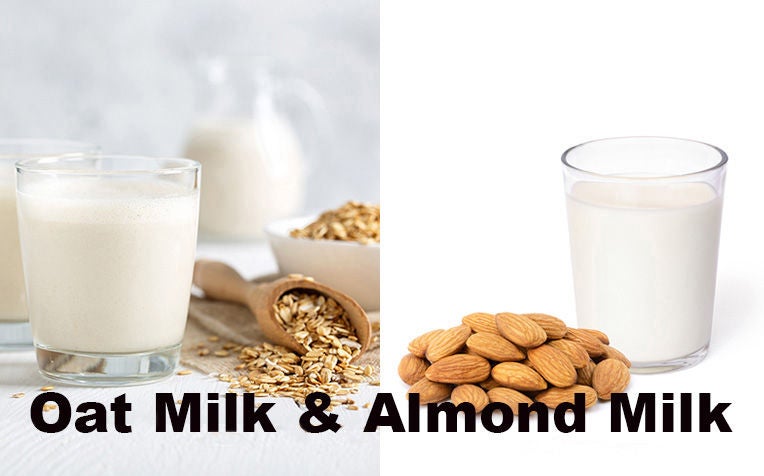1. Plant-based milks are popular alternatives for those with dietary restrictions or seeking more sustainable options.
2. Oat milk is higher in carbs but contains beneficial fiber; almond milk is low-calorie with vitamin E.
3. Plant-based milks generally have less protein and calcium than cow's milk, so choose fortified versions when possible.

Oat milk and almond milk are becoming increasingly popular as they are considered to be more sustainable, environmentally friendlier, and healthier compared to cow’s milk (dairy).
Many are making the switch from cow milk (dairy) to plant-based milk, believing it to be more sustainable, environmentally friendlier, and healthier compared to cow’s milk.
Others may also consume them due to dietary restriction (e.g. vegetarian diet) and personal preferences. Non-dairy milk appears to be a popular alternative for people who are intolerant to dairy milk or have cow’s milk protein allergy.
How is oat milk made?
"Oat milk is produced by blending oats with water and straining off the liquid. It (oat milk) is naturally sweet and contains a higher amount of carbohydrates compared to cow’s milk, therefore it may not be suitable for people with diabetes," shares Ms Joey Ho, Dietitian from the Nutrition and Dietetics Department at KK Women's and Children's Hospital (KKH), a member of the SingHealth group.
"However, oat milk provides a good source of fibre, and current evidence shows that consuming foods with soluble fibre such as beta-glucans may improve total and LDL (low-density lipoproteins) cholesterol levels. Beta-glucans bind with cholesterol-rich bile acids in the intestine and transport them through the digestive tract and eventually out of the body, which results in the reduction of blood cholesterol levels," she adds.
Such effects could also be contributed by the reduction of cow’s milk consumption, as it decreases the amount of saturated fat consumed in diet.
How is almond milk made?
Almond milk is made by soaking almonds with water and straining away the solids. "Almond milk may be suitable for people who are intolerant to both soy and dairy milk, but may not be suitable for those with nut allergies," Dietitian Ms Joey Ho adds.
Although almonds are a good source of plant-based protein, it contains lower protein and calcium content than cow’s milk. Almond milk also tends to be high in unsaturated fat and low in calories. Plus, some brands may contain added sugar to extend shelf life as well as to improve its taste and texture.
When compared to other plant-based milk and dairy, almond milk is a naturally good source of the antioxidant vitamin E. It is a type of fat-soluble vitamin that is involved in the human body’s immune function, protects cells from the damaging effects of free radicals that may potentially lead to the development of cancer and cardiovascular disease; however current research is insufficient to confirm such effects.
Milk type
| Cow's milk (Low fat, high calcium) | Oat milk (Unsweetened, calcium-fortified) | Almond milk (Unsweetened, calcium-fortified) |
|---|---|---|---|
Calories (kcal) | 120 | 115 | 30 |
Carbohydrate (g) | 12.5 | 18 | 0.5 |
Protein (g) | 9.3 | 3 | 2 |
Total fat (g) (Saturated fat) (g) |
3.8
|
2.75
|
5
|
Fibre (g) | 0 | 2 | 1.25 |
Vitamin B12 (ug) | 0.5 | 0.75 | 0.95 |
Calcium (mg) | 500 | 280 | 230 |
Vitamin D (mcg) | 3 | 1.25 | 1.9 |
Vitamin E (mg) | n/a | n/a | 0.75 |
Are oat milk and almond milk always the better choice over cow's milk?
Oat milk and almond milk may not be a nutritionally adequate substitute for young children due to its low protein and calcium content which are essential for growth and development.
Ultimately, when deciding which plant-based milk to consume, your choice should also take into account of your overall diet as there is no simple answer as to which milk is the best. Do remember to always check the nutrition panel for ingredients such as added sugar and unwanted additives (e.g. flavoring and colouring). For healthier choices, do choose calcium-fortified and unsweetened options for such plant-based milks.
Ref: K21
Check out our other food and nutrition articles:
Is Soy Milk Always Better Than Cow Milk (Dairy)?
Dried Fruits: Nutritional Benefits
Tea, Is It Healthier Than Coffee?
5 Super Foods for Beautiful Skin
Contributed by

















 Get it on Google Play
Get it on Google Play